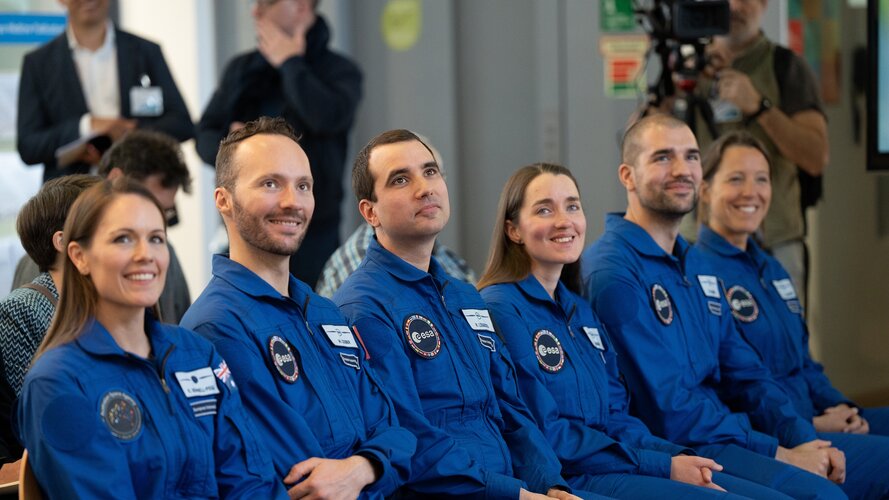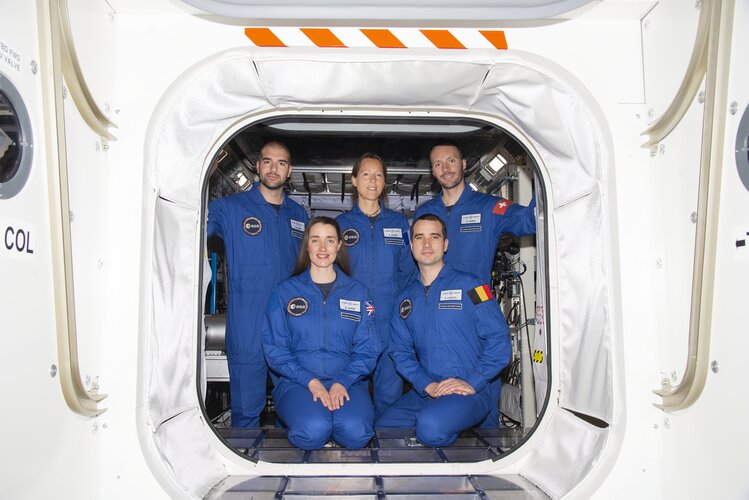Ground wide angle camera array detects prompt optical emission of gamma-ray burst
Wednesday, 03 May 2023 11:00 Researchers led by Dr. XIN Liping from the Space-based Multi-band Astronomical Variable Objects Monitor (SVOM) research team, National Astronomical Observatories of the Chinese Academy of Sciences (NAOC), have detected the prompt optical emission and its transition to the early afterglow of a gamma-ray burst (GRB 201223A), using the Ground Wide Angle Camera Array (GWAC) located at Xinglong Obser
Researchers led by Dr. XIN Liping from the Space-based Multi-band Astronomical Variable Objects Monitor (SVOM) research team, National Astronomical Observatories of the Chinese Academy of Sciences (NAOC), have detected the prompt optical emission and its transition to the early afterglow of a gamma-ray burst (GRB 201223A), using the Ground Wide Angle Camera Array (GWAC) located at Xinglong Obser A stormy, active sun may have kickstarted life on Earth
Wednesday, 03 May 2023 11:00 The first building blocks of life on Earth may have formed thanks to eruptions from our Sun, a new study finds.
A series of chemical experiments show how solar particles, colliding with gases in Earth's early atmosphere, can form amino acids and carboxylic acids, the basic building blocks of proteins and organic life. The findings were published in the journal Life.
To understand the
The first building blocks of life on Earth may have formed thanks to eruptions from our Sun, a new study finds.
A series of chemical experiments show how solar particles, colliding with gases in Earth's early atmosphere, can form amino acids and carboxylic acids, the basic building blocks of proteins and organic life. The findings were published in the journal Life.
To understand the Examining a Potential Drill Spot: Sols 3817-3818
Wednesday, 03 May 2023 11:00 Our weekend drive got us into a good position to attempt to examine a block we might attempt to drill. We don't dive right in; we have to make sure this is in fact where we want to drill. This means contact science on "Ubajara," which you can see on the left of the image above. The GEO team spent some time picking a special target name, which involved looking at pictures of national parks. Ubaja
Our weekend drive got us into a good position to attempt to examine a block we might attempt to drill. We don't dive right in; we have to make sure this is in fact where we want to drill. This means contact science on "Ubajara," which you can see on the left of the image above. The GEO team spent some time picking a special target name, which involved looking at pictures of national parks. Ubaja Sidus Space and Lulav Space team up for navigation and control of lunar spacecraft
Wednesday, 03 May 2023 11:00 Sidus Space, Inc. (NASDAQ:SIDU), a Space and Defense-as-a-Service satellite company focused on mission-critical hardware manufacturing; multi-disciplinary engineering services; satellite design, production, launch planning, mission operations; and in-orbit support, is pleased to announce it has signed a memorandum of understanding with Lulav Space, an Israeli robotics company specializing in spa
Sidus Space, Inc. (NASDAQ:SIDU), a Space and Defense-as-a-Service satellite company focused on mission-critical hardware manufacturing; multi-disciplinary engineering services; satellite design, production, launch planning, mission operations; and in-orbit support, is pleased to announce it has signed a memorandum of understanding with Lulav Space, an Israeli robotics company specializing in spa Alberta researcher to help select samples to bring back from Mars
Wednesday, 03 May 2023 11:00 A University of Alberta researcher is among a group of scientists choosing which samples NASA's rover Perseverance will gather on Mars to bring back for analysis on Earth.
For this mission, "return sample scientist" Chris Herd, a professor in the Department of Earth and Atmospheric Sciences and curator of the U of A's Meteorite Collection, will help determine which samples could answer the
A University of Alberta researcher is among a group of scientists choosing which samples NASA's rover Perseverance will gather on Mars to bring back for analysis on Earth.
For this mission, "return sample scientist" Chris Herd, a professor in the Department of Earth and Atmospheric Sciences and curator of the U of A's Meteorite Collection, will help determine which samples could answer the NASA selects Emily Nelson as Chief Flight Director
Wednesday, 03 May 2023 11:00 NASA has named Emily Nelson its new chief flight director, leading the group that directs human spaceflight missions from the Mission Control Center at the agency's Johnson Space Center in Houston.
Norm Knight, the agency's director of flight operations, selected Nelson to replace Holly Ridings, who held the position from 2018 to 2022, and now helps lead the agency's Gateway Program, an in
NASA has named Emily Nelson its new chief flight director, leading the group that directs human spaceflight missions from the Mission Control Center at the agency's Johnson Space Center in Houston.
Norm Knight, the agency's director of flight operations, selected Nelson to replace Holly Ridings, who held the position from 2018 to 2022, and now helps lead the agency's Gateway Program, an in SmartSat sends stellar PhD students to NASA JPL for career-boosting internships
Wednesday, 03 May 2023 11:00 SmartSat Cooperative Research Centre (CRC), Australia's leading space research centre, has announced a prestigious program to fund two PhD students to undertake an intensive ten-week internship at NASA's Jet Propulsion Laboratory (JPL) in California, USA.
Aspiring space leaders Anne Bettens, from the University of Sydney, and Emily Ahern, from the University of Adelaide, have been paired w
SmartSat Cooperative Research Centre (CRC), Australia's leading space research centre, has announced a prestigious program to fund two PhD students to undertake an intensive ten-week internship at NASA's Jet Propulsion Laboratory (JPL) in California, USA.
Aspiring space leaders Anne Bettens, from the University of Sydney, and Emily Ahern, from the University of Adelaide, have been paired w ESA recruiting for key divisional directors
Wednesday, 03 May 2023 11:00 The European Space Agency is currently looking for a new Director of Connectivity and Secure Communications and new Director of Internal Services to join its executive board and support the Director General, with responsibility for relevant ESA activities and overall objectives.
b>Director of Connectivity and Secure Communications br> /b>
As Director of Connectivity and Secure Communicat
The European Space Agency is currently looking for a new Director of Connectivity and Secure Communications and new Director of Internal Services to join its executive board and support the Director General, with responsibility for relevant ESA activities and overall objectives.
b>Director of Connectivity and Secure Communications br> /b>
As Director of Connectivity and Secure Communicat NASA awards contracts for NOAA Coronagraph Instrument Phase A Study
Wednesday, 03 May 2023 11:00 NASA, on behalf of the National Oceanic and Atmospheric Administration (NOAA), has selected five firms for the Space Weather Next Lagrange 1 Series (L1 Series) Coronagraph (COR) Phase A Study. These contracted firms will provide services to help meet the objectives of NOAA's L1 Next Series.
The firms selected are Johns Hopkins Applied Physics Lab (APL), Laurel, Maryland; EO Vista, Acton, M
NASA, on behalf of the National Oceanic and Atmospheric Administration (NOAA), has selected five firms for the Space Weather Next Lagrange 1 Series (L1 Series) Coronagraph (COR) Phase A Study. These contracted firms will provide services to help meet the objectives of NOAA's L1 Next Series.
The firms selected are Johns Hopkins Applied Physics Lab (APL), Laurel, Maryland; EO Vista, Acton, M Deep-learning system explores materials' interiors from the outside
Wednesday, 03 May 2023 11:00 Maybe you can't tell a book from its cover, but according to researchers at MIT you may now be able to do the equivalent for materials of all sorts, from an airplane part to a medical implant. Their new approach allows engineers to figure out what's going on inside simply by observing properties of the material's surface.
The team used a type of machine learning known as deep learning to c
Maybe you can't tell a book from its cover, but according to researchers at MIT you may now be able to do the equivalent for materials of all sorts, from an airplane part to a medical implant. Their new approach allows engineers to figure out what's going on inside simply by observing properties of the material's surface.
The team used a type of machine learning known as deep learning to c Hughes launches new HughesNet plans for small businesses
Wednesday, 03 May 2023 11:00 Hughes Network Systems has announced new HughesNet plans for small businesses in the U.S. The new satellite internet service plans include features like business-grade support, express repair and free installation to support the needs of small businesses for network availability and high performance.
The plans also include low-latency HughesNet Fusion plans that seamlessly blend Geostation
Hughes Network Systems has announced new HughesNet plans for small businesses in the U.S. The new satellite internet service plans include features like business-grade support, express repair and free installation to support the needs of small businesses for network availability and high performance.
The plans also include low-latency HughesNet Fusion plans that seamlessly blend Geostation ESA’s Astronaut Class of 2022 | first news conference
Wednesday, 03 May 2023 11:00 Video:
00:34:37
Video:
00:34:37
ESA astronaut candidates Sophie Adenot, Pablo Álvarez Fernández, Rosemary Coogan, Raphaël Liégeois and Marco Sieber took up duty at the European Astronaut Centre (EAC) on 3 April 2023 to be trained to the highest level of standards as specified by the International Space Station partners.
Watch the replay of their first news conference from EAC in Cologne, Germany.
Plutonium availability constrains plans for future planetary missions
Wednesday, 03 May 2023 09:31
NASA may not have enough plutonium available to power a mission to Uranus recommended by the latest decadal survey until the latter half of the 2030s.
ESA astronaut candidates of the class of 2022
Wednesday, 03 May 2023 08:56 Image:
Image:
ESA's astronaut candidates of the class of 2022 at the European Astronaut Centre in Cologne, Germany.
The five candidates are Sophie Adenot, Pablo Álvarez Fernández, Rosemary Coogan, Raphaël Liégeois, and Marco Sieber. The group is part of the 17-member astronaut class of 2022, selected from 22 500 applicants from across ESA Member States.
The astronaut candidates will be trained to the highest level for future space missions. Basic training includes learning about space exploration, technical and scientific disciplines, space systems and operations, as well as spacewalks and survival training.
Euclid arrives at launch site
Wednesday, 03 May 2023 08:00
ESA’s Euclid spacecraft finished its ocean cruise safe and sound on 30 April at Port Canaveral in Florida. Subsequently, the satellite was moved by road to the Astrotech facility near Cape Canaveral.

